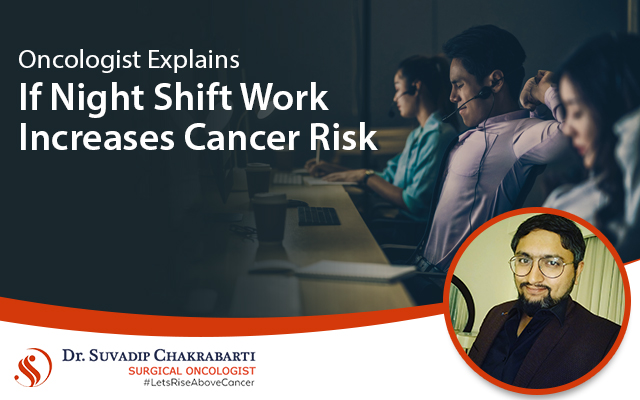A new study states that night-shift employees are more likely to acquire specific forms of cancer.
Healthy participants on simulated night shift or day shift schedules were employed in a recent study. The study’s findings show that night shifts disturb normal 24-hour rhythms in the activity of specific cancer-related genes. Night shift workers were more prone to DNA damage while also mistiming the body’s DNA repair processes to deal with that damage.
Cancer is more common in night shift workers, says Dr Suvadip Chakrabarti, a cancer doctor in Kolkata.
Studying the rhythms in cancer-related genes
Though the brain contains a central biological clock, practically every cell in the body has its own built-in clock. This cellular clock is made up of clock genes, which are rhythmic in their expression, meaning their activity levels fluctuate depending on the time of day or night. The researchers speculated that the expression of cancer-related genes would be rhythmic and that night shift employment might disturb this rhythmicity.
They ran a seven-day simulated shift work experiment with volunteers to put this to the test. Half of them went through a three-day simulated night shift schedule, while the other half went through a three-day simulated day shift schedule. After finishing their simulated shifts, all participants were kept in a continuous routine procedure intended to examine individuals’ internally generated biological rhythms that are independent of any external stimuli, says the oncologist in Kolkata.
They discovered that white blood cells extracted from the blood of night shift participants exhibited greater signs of DNA damage than white blood cells derived from the blood of day shift individuals. Furthermore, after exposing isolated white blood cells to ionizing radiation at two distinct times of day, cells demonstrated greater DNA damage in the night shift condition than in the day shift condition. This indicated that night shift participants’ white blood cells were more exposed to external damage from radiation, an established risk factor for DNA damage and cancer.
These data show that night shift schedules reduce the efficacy of the body’s DNA repair systems at a time when they are most required, says the cancer doctor in Kolkata.
Potential for improved prevention, treatment
The researchers’ next step is to replicate the experiment with real-world shift workers who have worked continuously on the day or night shifts for many years to see if unrepaired DNA damage accumulates over time in night shift workers, potentially increasing cancer risk.
Suppose the present findings hold true in real-world shift workers. In that case, this research might someday be utilized to create preventative tactics and medications to address the mistiming of DNA repair mechanisms. It might also serve as the foundation for methods to optimize the timing of cancer treatment so that it is provided when the effectiveness is highest and side effects are minimum.
For more details, consult Dr Suvadip Chakrabarti, a cancer surgeon in Kolkata.


